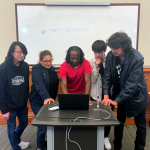106th Birthday Celebration
In 1918 UC Berkeley began a full-time program in library science. Join us for this year’s celebration of the founding and history of the School of Information, School of Information Management and Systems, School of Library and Information Studies, and School of Librarianship.
Program
Welcome and Comments on Berkeley as a Bellwether
Dean Eric T. Meyer
Introducing IceBerk, the I School’s Newest Research Community
Professor John Chuang
Sand Mining Watch: Mapping Sand Mines from Space
Suraj Nair
Ph.D. student
Robert Gitler’s Adventures in Japan, 1950–1956
Professor Emeritus Michael K. Buckland
Reception to follow.
Presentations
Welcome and Comments on Berkeley as a Bellwether
Dean Eric T. Meyer
Dean Eric T. Meyer will welcome participants and share a few thoughts on the next century for the field of information, and Berkeley’s role in it. It is obvious to everyone that information is embedded in all aspects of modern life, and it is up to Berkeley to be a bellwether leading the way in a world where information, technology, and people mutually shape the changes that are coming, allowing more people to reap the benefits. By being pragmatic rather than utopian or dystopian about the Internet, AI, data, and information, we can educate students and the wider society, create new knowledge, and influence policy.
Introducing IceBerk, the I School’s Newest Research Community
Professor John Chuang
Professor John Chuang will give a brief overview of the I School’s newest lab, IceBerk. He’ll explain what it is, why it was created, and what it aims to do. He’ll also explain why the I School’s intellectual community is distinctly qualified to work on problems of information as it relates to our changing climate.
Sand Mining Watch: Mapping Sand Mines from Space
Suraj Nair
Sand is a fundamental building block of modern life — it is a key ingredient in concrete, asphalt, glass, and many items of daily use. However, excessive and illicit sand mining in riverbeds is creating numerous environmental and social crises across the world, and is described as one of the pressing sustainability challenges of the 21st century. We present Sand Mining Watch, a set of open source tools that use modern machine learning algorithms in combination with publicly available satellite imagery to produce high-resolution, real-time maps of sand mining activity at a global scale. These tools offer a pathway to improved monitoring, transparency, and accountability, and illustrate how machine learning can be used to learn about the lasting consequences of environmental degradation.
Robert Gitler’s Adventures in Japan, 1950–1956
Professor Emeritus Michael K. Buckland
In 1950 the American Library Association sent our alumnus Robert Gitler, ’31, to Japan with a vague mission to start a library school. Michael recently discovered a trove of Gitler’s correspondence from his time in Japan at yard sale. He will discuss some of what he has uncovered in the cache of 900 letters to his mother which detail his daily adventures.
Speakers
Dean Eric T. Meyer
Eric T. Meyer is dean of the UC Berkeley School of Information, which he joined in 2024. His research looks at the changing nature of knowledge creation in science, medicine, social science, arts, and humanities as technology is embedded in everyday practices, as described in his 2015 book with co-author Ralph Schroeder Knowledge Machines: Digital Transformations of the Sciences and Humanities. His research has included both qualitative and quantitative work with blockchain developers, marine biologists, genetics researchers, physicists, digital humanities scholars, social scientists using big data, medical doctors, theater artists, librarians, and organizations involved in computational approaches to research. Dr. Meyer was previously dean of the School of Information at UT Austin (2018–2024) and Professor of Social Informatics at the Oxford Internet Institute, University of Oxford (2007–2018).
John Chuang
John Chuang is professor at the UC Berkeley School of Information. His research and teaching span the areas of climate informatics, biosensory computing, and incentive-centered design. He leads the BioSENSE Lab in studying brainwave authentication using passthoughts, affective biosensing, embodied decision-making, and privacy of ubiquitous sensing. His earlier work investigated strategic cybersecurity investments, incentives for peer production, and scalability of multicast trees. He received his Ph.D. in engineering and public policy from Carnegie Mellon University, M.S. in electrical engineering from Stanford University, and graduated summa cum laude in electrical engineering from the University of Southern California.
Suraj Nair
Suraj is a Ph. D. candidate at UC Berkeley's School of Information, where he is advised by Prof. Joshua Blumenstock. His research interests lie at the intersection of development economics and machine learning, and his recent work uses novel data and methods to understand the socio-economic consequences of environmental change. He is a recipient of the John L. Simpson Graduate Student Fellowship and the NSF Digital Transformation of Development Fellowship. He holds undergraduate and master’s degrees in development studies from the Indian Institute of Technology, Madras.
Michael K. Buckland
Michael’s professional experience as a librarian in the UK and the US focused on the management of university libraries, the design of improved services, and better support for search and discovery. This work is reflected three books: Library Services in Theory and Context, 2nd ed. (1988), Information and Information Systems (1991), and Redesigning Library Services (1992). He has also written on the history and theory of documentation, including a biography of the designer of the first electronic search engine, Emanuel Goldberg and his Knowledge Machine (2006). A recent book, Information and Society (MIT Press, 2017), provides a very concise introduction to a complex area. His best-known publication is the article “Information as thing.” In 2024, Michael was named one of two Emeriti of the Year at UC Berkeley.














